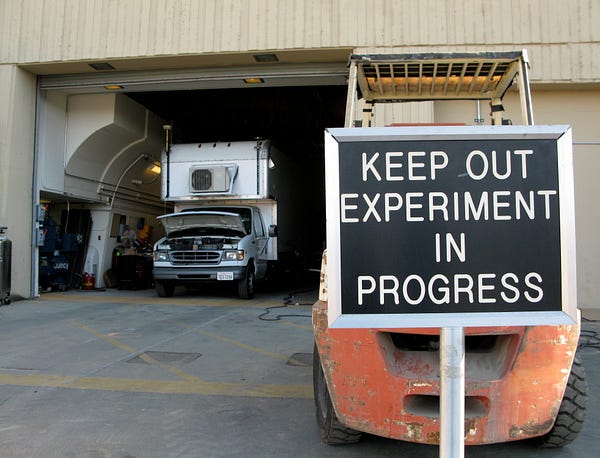 I was in elementary school, watching the TV live, when the Challenger exploded. My classmates and I were stunned and confused by what we saw. With the logic of a 9-year-old, I wrote a report on O-rings, trying desperately to make sense of a science I did not know and a public outcry that I couldn’t truly understand. I wanted to be an astronaut (and I wouldn’t give up that dream until high school!).
I was in elementary school, watching the TV live, when the Challenger exploded. My classmates and I were stunned and confused by what we saw. With the logic of a 9-year-old, I wrote a report on O-rings, trying desperately to make sense of a science I did not know and a public outcry that I couldn’t truly understand. I wanted to be an astronaut (and I wouldn’t give up that dream until high school!).
Years later, with a lot more training under my belt, I became fascinated not simply by the scientific aspects of the failure, but by the organizational aspects of it. Last week, Bob Ebeling died. He was an engineer at a contracting firm, and he understood just how badly the O-rings handled cold weather. He tried desperately to convince NASA that the launch was going to end in disaster. Unlike many people inside organizations, he was willing to challenge his superiors, to tell them what they didn’t want to hear. Yet, he didn’t have organizational power to stop the disaster. And at the end of the day, NASA and his superiors decided that the political risk of not launching was much greater than the engineering risk.
Organizations are messy, and the process of developing and launching a space shuttle or any scientific product is complex and filled with trade-offs. This creates an interesting question about the site of ethics in decision-making. Over the last two years, Data & Society has been convening a Council on Big Data, Ethics, and Society where we’ve had intense discussions about how to situate ethics in the practice of data science. We talked about the importance of education and the need for ethical thinking as a cornerstone of computational thinking. We talked about the practices of ethical oversight in research, deeply examining the role of IRBs and the different oversight mechanisms that can and do operate in industrial research. Our mandate was to think about research, but, as I listened to our debates and discussions, I couldn’t help but think about the messiness of ethical thinking in complex organizations and technical systems more generally.
I’m still in love with NASA. One of my dear friends — Janet Vertesi — has been embedded inside different spacecraft teams, understanding how rovers get built. On one hand, I’m extraordinarily jealous of her field site (NASA!!!), but I’m also intrigued by how challenging it is to get a group of engineers and scientists to work together for what sounds like an ultimate shared goal. I will never forget her description of what can go wrong: Imagine if a group of people were given a school bus to drive, only they were each given a steering wheel of their own and had to coordinate among themselves which way to go. Introduce power dynamics, and it’s amazing what all can go wrong.
Like many college students, encountering Stanley Milgram’s famous electric shock experiment floored me. Although I understood why ethics reviews came out of the work that Milgram did, I’ve never forgotten the moment when I fully understood that humans could do inhuman things because they’ve been asked to do so. Hannah Arendt’s work on the banality of evil taught me to appreciate, if not fear, how messy organizations can get when bureaucracies set in motion dynamics in which decision-making is distributed. While we think we understand the ethics of warfare and psychology experiments, I don’t think we have the foggiest clue how to truly manage ethics in organizations. As I continue to reflect on these issues, I keep returning to a college debate that has constantly weighed on me. Audre Lorde said, “the master’s tools will never dismantle the master’s house.” And, in some senses, I agree. But I also can’t see a way of throwing rocks at a complex system that would enable ethics.
My team at Data & Society has been grappling with different aspects of ethics since we began the Institute, often in unexpected ways. When the Intelligence and Autonomy group started looking at autonomous vehicles, they quickly realized that humans were often left in the loop to serve as “liability sponges,” producing “moral crumple zones.” We’ve seen this in organizations for a long time. When a complex system breaks down, who is to be blamed? As the Intelligence & Autonomy team has shown, this only gets more messy when one of the key actors is a computational system.
And that leaves me with a question that plagues me as we work on our Council on Big Data, Ethics, and Society whitepaper: How do we enable ethics in the complex big data systems that are situated within organizations, influenced by diverse intentions and motivations, shaped by politics and organizational logics, complicated by issues of power and control?
No matter how thoughtful individuals are, no matter how much foresight people have, launches can end explosively.
(This was originally posted on Points.)

It’s amazing to me how few variables it takes to make a system truly complex!